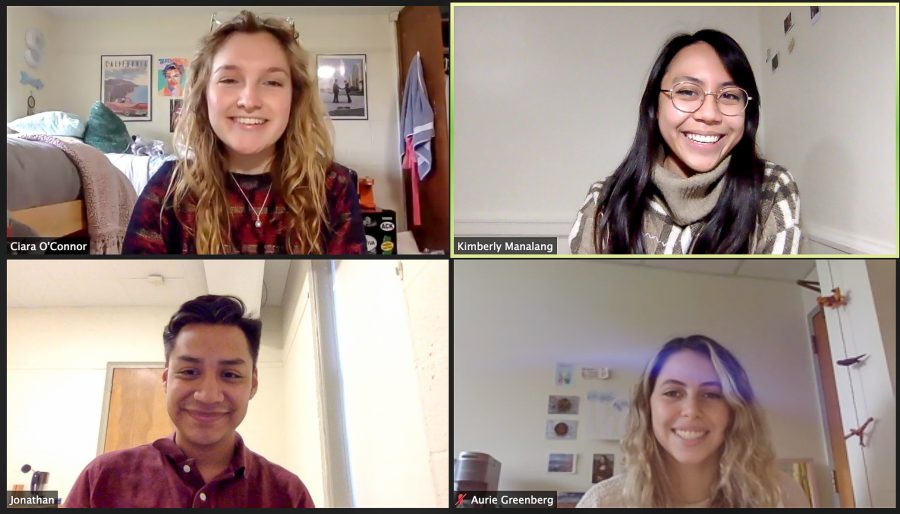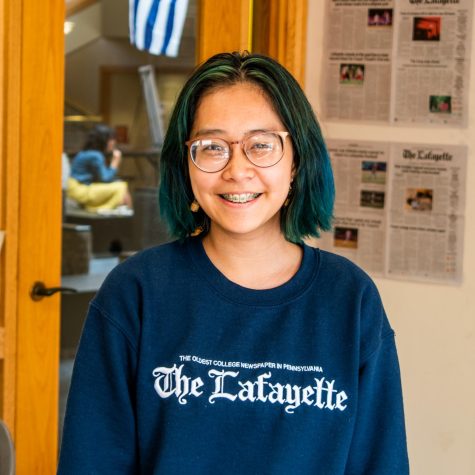For its core organizers, Migration Week is all about keeping the conversation alive.
The week, which consisted of programs discussing immigration and refugee communities, was organized by the Landis Center and Alternative School Break (ASB) and will conclude this weekend with the long-awaited Migration Summit.
On Monday, the Landis Center’s MOSAIC Tutoring Team hosted the first event of the week, a panel called “Continuing the Conversation on ICE.” The panel followed a program held last fall entitled “Having the Conversation on ICE.” While last semester’s panel focused on student and faculty perspectives of ICE detention centers, this most recent panel highlighted the work of activist organizations in Pennsylvania.
The panel featured representatives from the Free Migration Project (FMP) and the Movement of Immigrant Leaders in Pennsylvania (MILPA). FMP is a Philadelphia-based nonprofit that provides legal support to undocumented immigrants, and MILPA is a network of families that advocates for an inclusive citizenship path and driver’s licenses for all, regardless of citizenship status.
“Before this year, MOSAIC has kind of been on the same cycle of what they cover for awareness weeks…We never stepped out of this comfort zone,” said Kimberly Manalang ’21, one of the students who organized the Landis Center panel.
However, Manalang said that Lafayette is changing for the better, slowly but surely. She cited Disabilities Awareness Week, which hadn’t been recognized on campus until this year.
On Thursday, ASB presented a panel entitled “Eddy’s Undocu-story” (“La Historia Indocumentada de Eddy” in Spanish) in collaboration with the Arizona-based organization BorderLinks. The panel featured grassroots educators Eddy Palencia and Josue Saldivar. Saldivar spoke about his time in a detention center facility as well as his experience afterwards.
“No one talks about what happens once [migrants] are released. They focus mainly on the horrible conditions that people are going through within the detention centers,” said Flor de Maria Caceres ’22, who translated the event from Spanish to English. “But no one talks about what happens after—their mental health capacities or stability and how to better support them to reintegrate into society in whatever way that may look like.”
Finally, the Lafayette Migration Summit will take place this Saturday and Sunday. It is a weekend-long workshop that Caceres described as an encapsulation of the conversations about what it means to support refugee resettlement and undocumented immigrants through scholarship, activism and patronage of undocumented-owned businesses. The summit was organized by Caceres and Milena Berestko ’22 in collaboration with Refugee Action, Undocufund and the Hispanic Society of Lafayette (HSL).
Sign-ups for the Migration Summit will be open until the event.
Caceres said that she and Berestko have wanted to organize something like the Migration Summit since they hosted the Defend DACA workshop together in the fall of 2019. When Refugee Action approached them about collaborating on the summit so that it included refugee communities as well as undocumented immigrants, Caceres embraced the idea.
“Even though we have different issues pertaining to our experiences, we’re still part of the same system that continues to harm our communities,” Caceres said of the refugee and undocumented communities. “So that’s why we call it Migration Week, because that way it encapsulates different issues affecting these different communities.”
In addition to these three programs, the organizers of Migration Week also collaborated with Lafayette Mutual Aid to raise funds for their next round of donations. The fundraiser is competing to raise more money than the Lehigh Immigration Coalition.
“While we are having these conversations, we also wanted to implement different action plans that people can partake in,” Caceres said of the fundraiser.
As a part of Migration Week, Dear Lafayette College organized a protest against the Berks County immigration detention center in Pennsylvania, which had been one of three detention centers for immigrant families in the U.S. Although the center has released its families, there is still talk of it being turned into a women’s holding facility.
“It’s basically protesting what politicians have promised not to do, which is turning [Berks] into another holding facility instead of, let’s say, a community center where folks from the community can come by and be supported through different resources or different support systems,” said Caceres.
The protest was originally set to start on Sunday in the Quad after the Migration Summit. However, due to Lafayette’s suspension of in-person student group events until April 26, the protest has been tentatively rescheduled to April 30.
Caceres said that Migration Week indicates the start of increased advocacy for undocumented immigrants, and for undocumented students at Lafayette in particular.
“Four or five years ago, Lafayette had just accepted its first set of undocumented students…You accepted us; now you have to give us the support that you said that you would provide for us,” Caceres said. “For so long, Lafayette has swept it under the rug or has not really acknowledged it, but I’m like, ‘No, no, it’s time to change. Let’s try and do something.’”
Similarly, Manalang said she hopes Migration Week will encourage students to become more involved with activism.
“We have so much voice compared to faculty and staff,” Manalang said. “I think Lafayette students don’t understand the voice they have if they put their mind and power into the passions that they want to be recognized.”
“We’re on a hill. We don’t interact much with the downtown area or even beyond that,” Cacares said. “How can we step out of our comfort zone and try to reach out to different communities that we’ve never reached out to before?”























































































































